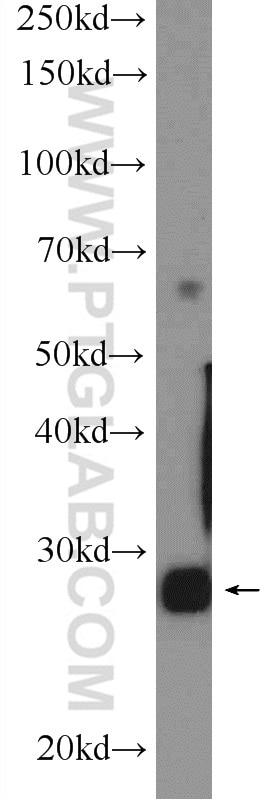Validation Data Gallery
Tested Applications
| Positive WB detected in | mouse testis tissue |
Recommended dilution
| Application | Dilution |
|---|---|
| Western Blot (WB) | WB : 1:500-1:1000 |
| It is recommended that this reagent should be titrated in each testing system to obtain optimal results. | |
| Sample-dependent, Check data in validation data gallery. | |
Product Information
25518-1-AP targets PGAM2-Specific in WB, ELISA applications and shows reactivity with human, mouse samples.
| Tested Reactivity | human, mouse |
| Host / Isotype | Rabbit / IgG |
| Class | Polyclonal |
| Type | Antibody |
| Immunogen |
Peptide 相同性解析による交差性が予測される生物種 |
| Full Name | phosphoglycerate mutase 2 (muscle) |
| Calculated molecular weight | 28 kDa |
| Observed molecular weight | 29 kDa |
| GenBank accession number | NM_000290 |
| Gene Symbol | PGAM2 |
| Gene ID (NCBI) | 5224 |
| RRID | AB_2880115 |
| Conjugate | Unconjugated |
| Form | |
| Form | Liquid |
| Purification Method | Antigen affinity purification |
| UNIPROT ID | P15259 |
| Storage Buffer | PBS with 0.02% sodium azide and 50% glycerol{{ptg:BufferTemp}}7.3 |
| Storage Conditions | Store at -20°C. Stable for one year after shipment. Aliquoting is unnecessary for -20oC storage. |
Background Information
Phosphoglycerate mutase (PGAM), an important enzyme in the glycolytic pathway, catalyzes the transfer of a phosphate group between the 2 and the 3 positions of glyceric acid. The muscle-specific isoform (type M, PGAM2) of phosphoglycerate mutase (PGAM) is a housekeeping enzyme and it catalyzes the conversion of 3-phosphoglycerate into 2-phosphoglycerate in the glycolysis process to release energy. It is encoded by the Pgam2 gene. In addition, it is demonstrated that PGAM2 locates both in cytoplasm and nuclei, and takes part in the glycometabolism process of cytoplasm and nuclei(PMID: 18499067). Defects in PGAM2 are the cause of glycogen storage disease type 10 (GSD10). This antibody is specific for PGAM2.
Protocols
| Product Specific Protocols | |
|---|---|
| WB protocol for PGAM2-Specific antibody 25518-1-AP | Download protocol |
| Standard Protocols | |
|---|---|
| Click here to view our Standard Protocols |

